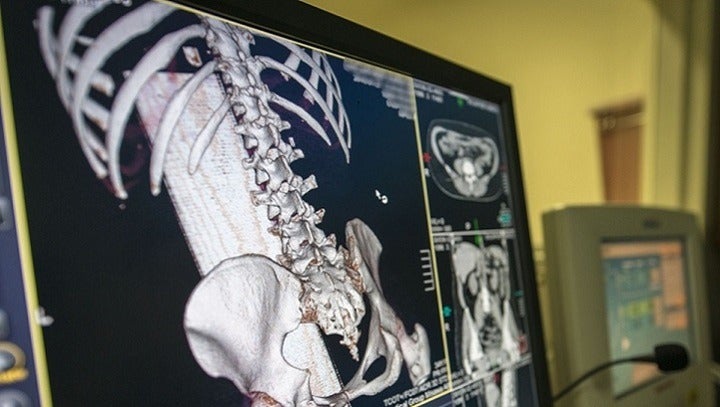
AI company Nvidia and King’s College London university have developed the UK’s first AI-powered platform for radiologists.
The new development will be incorporated across the NHS hospitals to automate diagnostic imaging analysis, which is considered the most time-consuming radiology process.
The integration of AI into medicine and its transformative impact – particularly on radiology practice since using augmented and virtual reality has been beneficial in understanding medical procedures and diseases through interactive training sessions.
NVIDIA’s AI technology to be implemented at hospitals in London is hoped to lead to potential breakthroughs and discoveries across the medical imaging landscape, by identifying diseases earlier and more accurately.
Jaap Zuiderveld,Vice President of EMEAI at Nvidia told NS Medical Devices: “There are not enough radiologists to cope with the ever-increasing demand on our healthcare system. We need to attract and train more talent.
“Bringing AI to the point of care can attract people interested in AI as well as remove some of the more mundane aspects of a radiologist’s time, prioritising the most urgent cases and supporting the diagnosis of negative results.”
What technology are being used to build the AI platform across NHS hospitals?
To improve the overall quality of care being provided by the NHS, Nvidia’s DGX-2 supercomputers and the Nvidia Clara AI toolkit are both being implemented by the university as part of the project.
Nvidia is one of the largest platforms building graphical process units and its work on AI and machine learning is known as some of the most ingenious using deep learning today, specifically in healthcare and medical imaging.
Mr Zuiderveld said: “Nvidia is a formal collaborator in the King’s College London Medical Imaging and AI Centre for Value-Based Healthcare, along with several other excellent partners.”
“Our focus is to deploy and implement DGX-2 and DGX-1 AI systems at King’s College London and soon in each of the hospitals.
“Our technical team will also support the design and development of the Federated Learning solution.”
As security and governance of of data in clinical environments is of the highest importance, it will be the first time in the NHS that “federated learning” will be applied to algorithm development to ensure the privacy of patient data.
Federated learning keeps data within its own, secure domain, while allowing algorithms to be developed at multiple sites using data located at hospitals around the UK – a crucial approach for the development of AI in clinical environments.
“This is fundamental to the program, ensuring the security and integrity of the data as well as the platform that will allow the clinical algorithms to run ‘NiftyNet’ and Nvidia Clara.”
The Nvidia Clara AI toolkit is a key part of the Nvidia Clara developer platform on which intelligent workflows can be built to help accelerate AI in medical imaging.
It consists of libraries for data and image processing, AI model processing, and visualisation, which means the data does not leave the safety of the hospital where it is stored.
Mr Zuiderveld explained: “The only movement will be of the trained model that contains important attributes of the clinical data, whilst being certain not to contain any patient identifiable data.
“This new AI solution will have exceptional skills and King’s College London, Nvidia and other partners, with their expertise, will make this solution a reality.”
How the UK is working towards the next milestone in AI
There’s no end to AI, and certainly not in the healthcare sector. Digital technologies are being re-invented and revolutionised all the time.
The AI market in healthcare is due to increase tenfold by 2025, becoming a $13 billion industry, according to Global Market Insights.
“The key to the future of AI in healthcare is bringing it out of the research environment and to the point of care, where it can have a positive effect on patient care,” explains Mr Zuiderveld.
The first milestones to implement at King’s College London is setting an appropriate infrastructure for an AI platform.
Mr Zuiderveld explained this done by defining the first clinical programs to collaborate on, understand the regulatory and governance requirements to ensure compliance, and then mobilise all the collaborators.
He said: “Initially, it’s key to look at high-value low-hanging fruit. This could be the productivity of the radiologist or pathologist, enabling better workflow and ensuring patients get put on the right clinical pathway as soon as possible.
“This will ultimately improve patient outcome and hospital efficiency. One of the other interesting areas is trying to predict the patients who may not make it to an appointment, enabling the hospital to resource appropriately throughout the day and night.
“From what may see simple user cases can have enormous impact on the efficiency of the hospital, the job satisfaction of the staff and ultimately better patient outcomes.
“At this point we have to assess the value that this is bringing to our health system. A positive value and this can gain national interest at the highest levels and interest in adoption across the NHS.”



